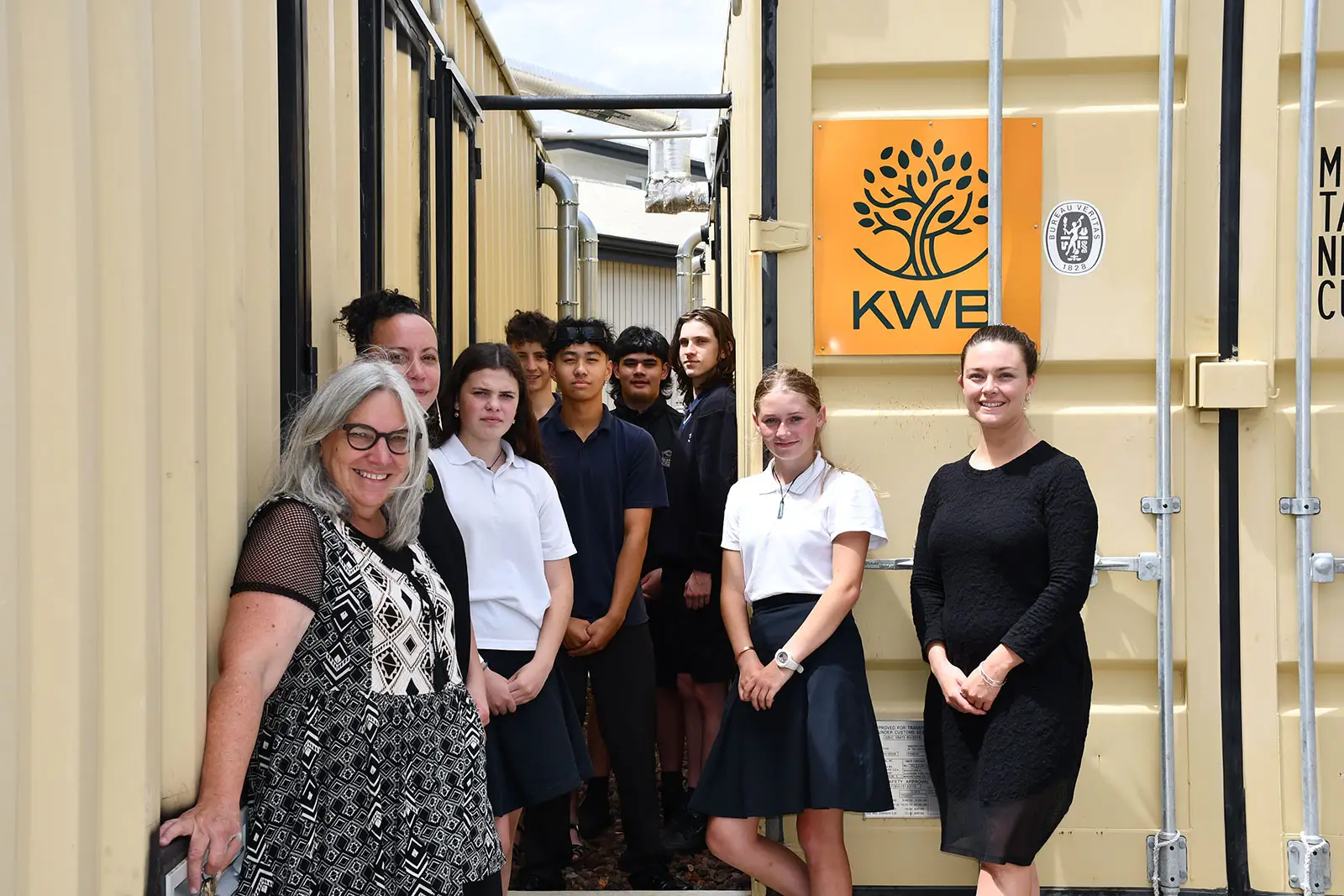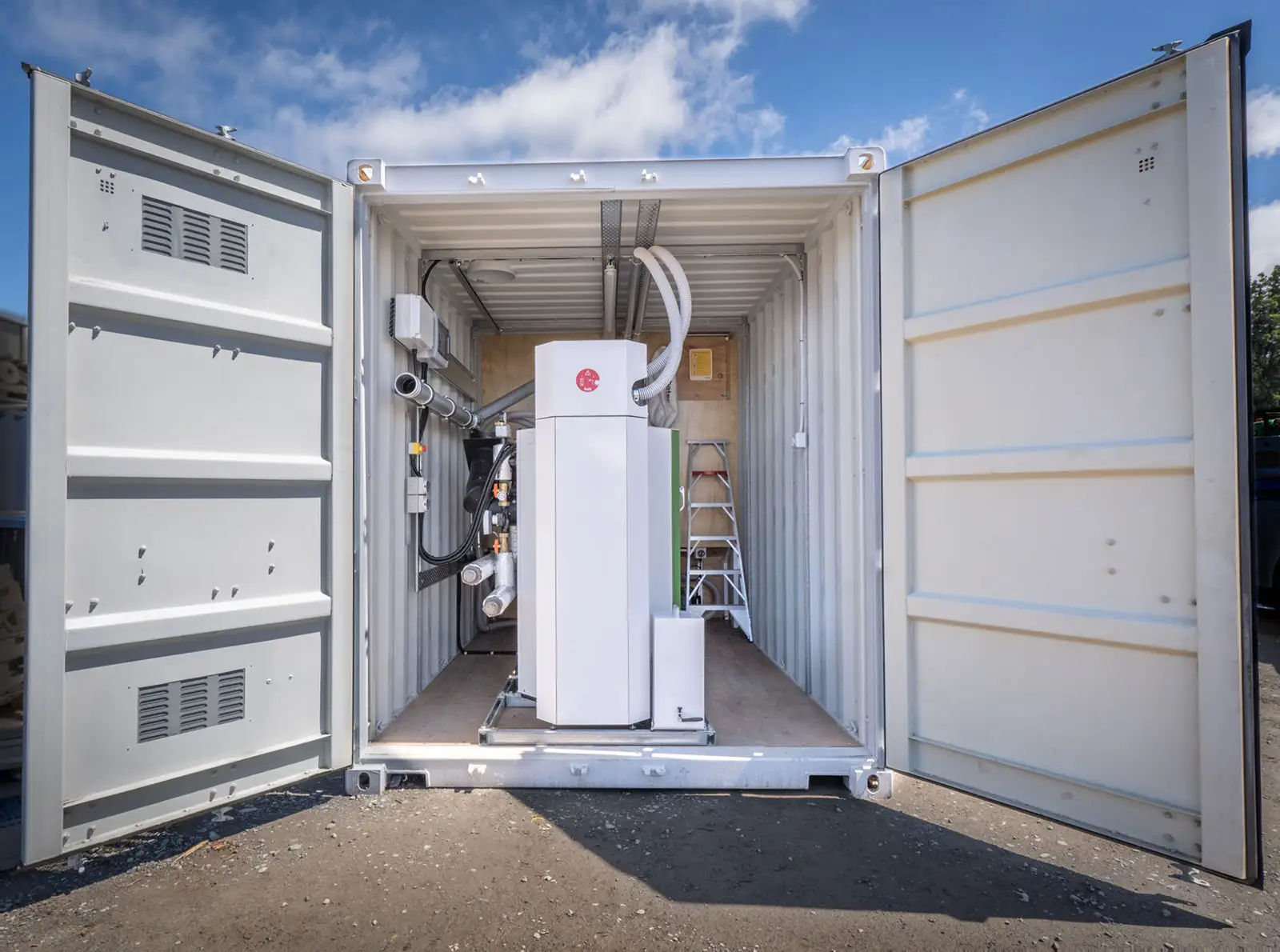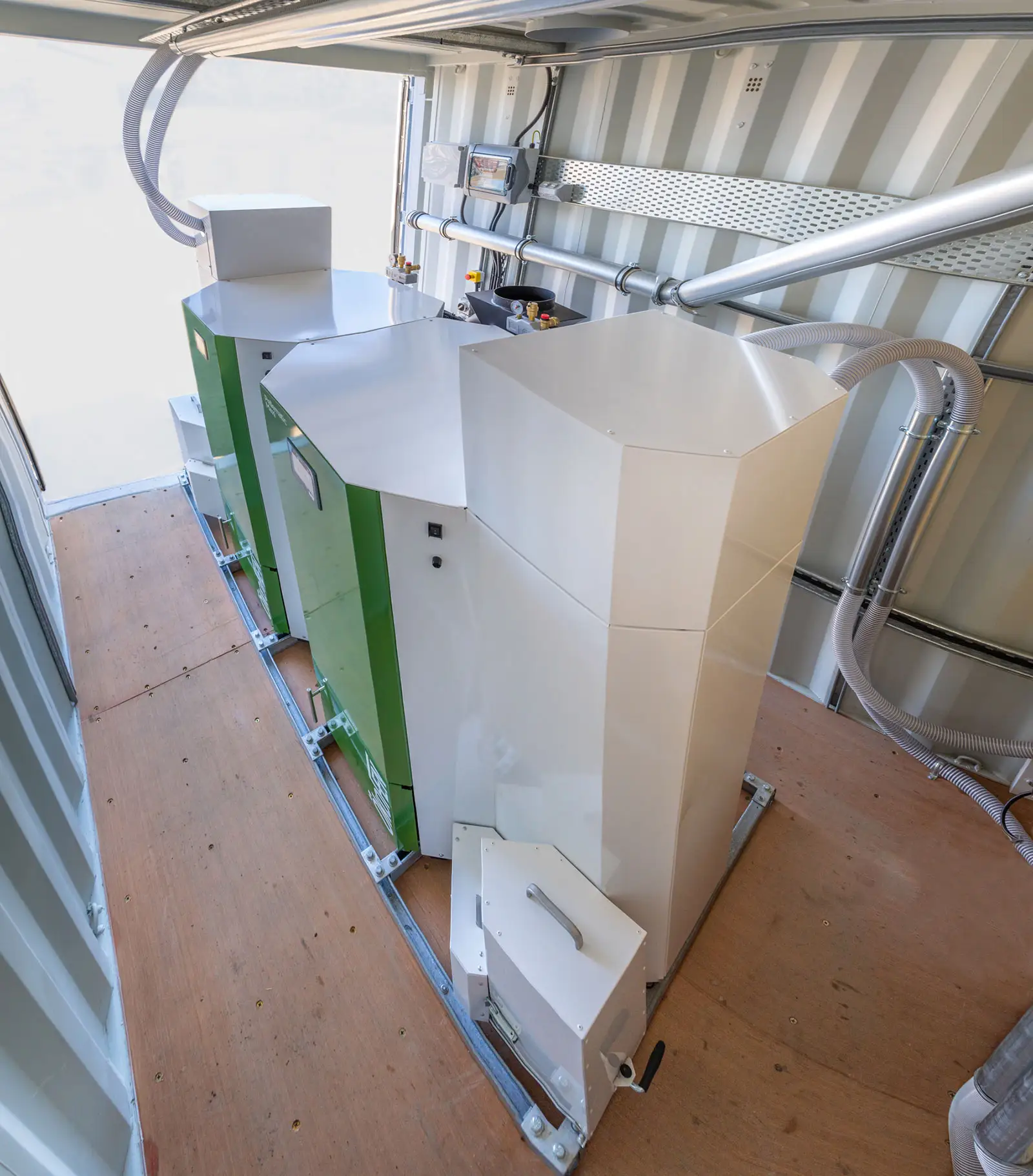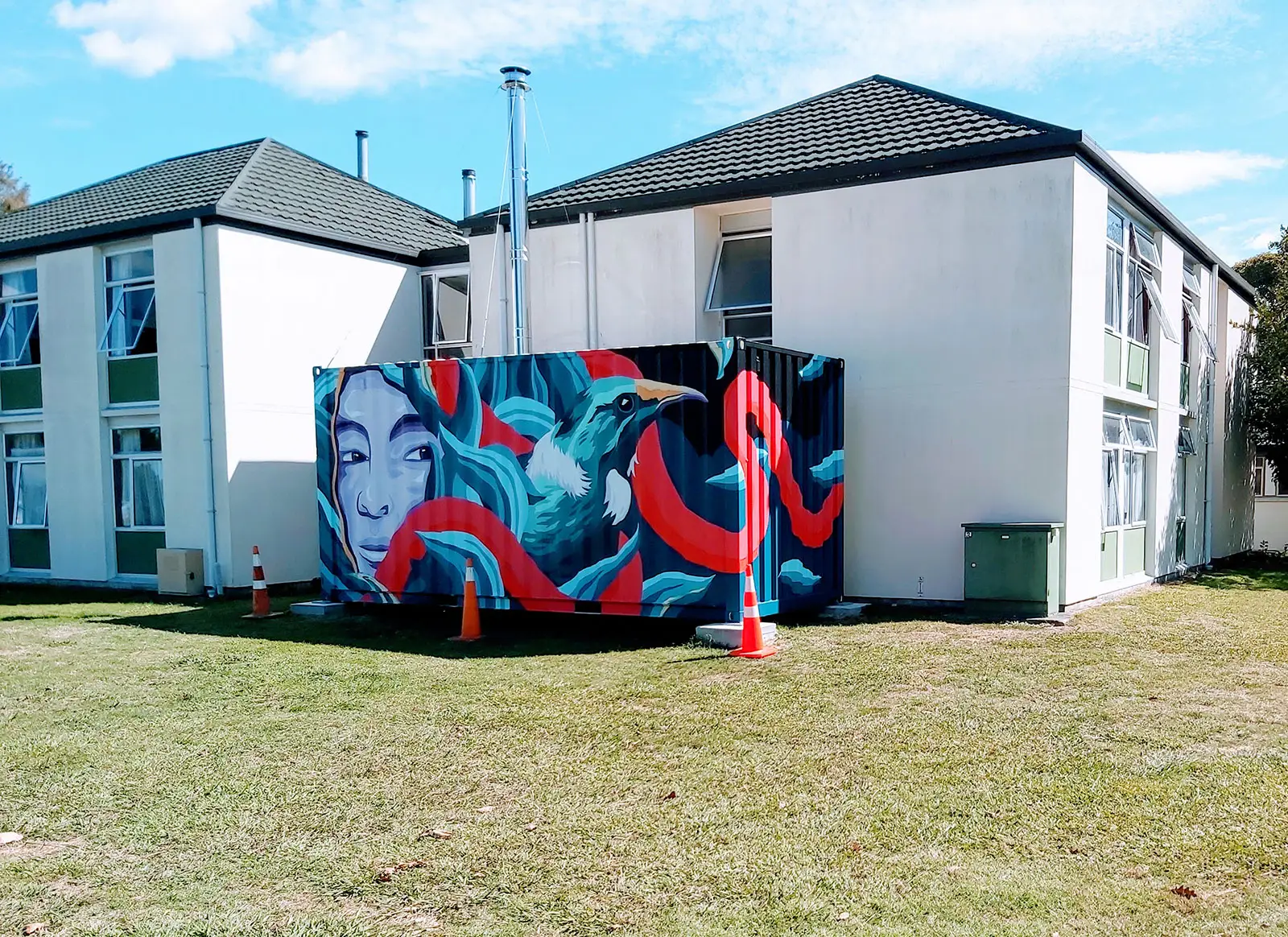Ruapehu College has already made the switch to a low-emission heating system and are demonstrating the impact well beyond reducing the school’s reliance on fossil fuel.

Ruapehu College has recently welcomed two new 40-foot containerised wood pellet boilers in March 2022 – replacing a very old coal boiler which had become a major concern for the staff. The boilers work in tandem to provide 500kw to the school to heat its classrooms.
“We’re relieved to have a heating source that is better for the environment,” said Marama Allen, Ruapehu College Principal.
The college is well known for its position in the shadow of Mount Ruapehu, and has the unique demands of its local climate to consider. On a normal winter’s day, the temperature is usually below 5°C in the early morning and has been recorded as low as -13°C, meaning reliability of heating is paramount.
Energy in a box
Following some in-depth scoping work by EECA (the Energy Efficiency and Conservation Authority) Ruapehu College’s coal boiler was replaced with an innovative solution that has been used to replace fossil fuel-powered boilers across a number of New Zealand’s education institutions - a wood pellet boiler inside a shipping container.

The replacement was carried out under the Ministry of Education (MOE’s) School Coal Boiler Replacement Programme, which was established in 2020.
Instead of coal, the containers use carbon-neutral wood pellets produced using waste wood from timber production and forestry. This avoids the need to send the unused product to landfill, as the ‘waste’ product is 100% renewable.
The pellets have the lowest emission impact of any fuel available in New Zealand, including our highly renewable electricity grid. While burning the pellets creates CO2, and a small amount of methane, replanting the area from which it was sourced means that the CO2 emissions released are effectively ‘recycled’.
“The air also feels cleaner, which the students are happy about as they love the outdoors” said Marama.
Knowing our heating source is not impacting the environment is important to us - as an education facility we need to be leading and teaching by example for our young learners.
Determining the best solution for a school
In addition to funding allocation, EECA facilitates the completion of individual feasibility studies for each of the schools. The purpose of this study is to identify the best solution for a school, and make a recommendation based on technical and cost factors.
The best solution may depend on:
- The location of the school
- The availability of resources in that location
- Specific features of the site – such as access and availability of space.
- Whether the school has already started to transition away from coal to another type of low-emissions heating.
Replacement solutions recommended to schools
- 66 wood pellet boilers
- 5 air - water heat pumps
- 42 air - air heat pumps
- 10 wood chip boilers
The container boilers were manufactured and pre-commissioned in Rotorua. After being delivered to the school they were essentially ‘plugged in’ and able to be used.
Aquaheat Facilities Services, the supplier responsible for installing the containers, has also identified positives beyond emissions reduction.
“The ash from the wood pellets can be used on school gardens, and the system is a lot quieter than a coal boiler,” says Phil Thorpe, General Manager of Decarbonisation Initiatives.
“It also promises a lot less wasted heat. Rather than cranking up an old boiler and keeping it burning all day, the system can be switched on and off as needed, and the heat is almost immediate.”
Generational benefits
At Ruapehu College, education isn’t confined to the classroom, with the school also incorporating sustainability initiatives and projects into the curriculum to give students a more holistic and hands-on relationship with their local environment.
The physical removal of a coal boiler and replacement with a sustainable alternative for providing energy has proven to be a valuable opportunity for students to witness a step away from a reliance on fossil fuels.
“Building on previous work, our 2023 curriculum will be developed further to implement local environmental studies – and the new boilers provide us with an example of climate action in everyday life,” says Marama.

This has been supported by Aquaheat Facilities Services, who are introducing QR codes on the side of their containerised boilers. Students will be able to scan to learn about why the transition has been made, and how it has improved the environmental outcomes for their college, local community, and on a larger scale, the planet.

The college’s art and technology team are facilitating the creation of a flora and fauna inspired mural of students’ artwork. The mural is designed to bring life and personality to the outside of the containerised boilers, making them an art piece for the school that communicates their sustainability narrative for future students.
Benefits of containerised wood pellet boilers
- Integrated storage – wood pellets are delivered by truck and transferred into the container itself, where they are stored and used.
- User friendly – the automated system means that fuel does not need to be handled, and can be turned on and off as needed, with minimal maintenance and noise.
- Easy install – containers are built off site and delivered in a ‘plug and play’ state. Building consent is not needed, and the system can connect to existing pipework and radiators.
- Versatile – containers can be moved from site to site and can be joined together in ‘cascade’ if more energy is required.
- Space effective – a standard 20-foot container fits inside a parking spot.
- Low emission – renewable wood pellets are effectively carbon neutral – producing around 99% less CO2 emissions than coal. The ash produced can be used as compost for school gardens.
State Sector Decarbonisation
Replacing these old systems with safer, cleaner alternatives is a key step in the decarbonisation of New Zealand’s State sector. Through the same fund, EECA is also working on phasing out coal boilers across other organisations in the State sector, such as hospitals, universities, and prisons.
These are usually replaced with a low emissions alternative when the current boiler is near the end of its life. However, EECA has a focus on removing coal boilers as quickly as possible, prioritising the largest and most active.
Read next
-
State sector decarbonisation fund
The Government aims to make the public sector carbon neutral from 2025.
-
Out with the coal, in with the new
Students at two kiwi public schools will be starting the new year in a classroom that can be heated with clean energy – after kicking coal to the curb.
-
All coal boilers to be removed from schools
More state sector organisations and schools will be supported to switch to clean energy as part the Government's plan for a carbon neutral public sector by 2025.
